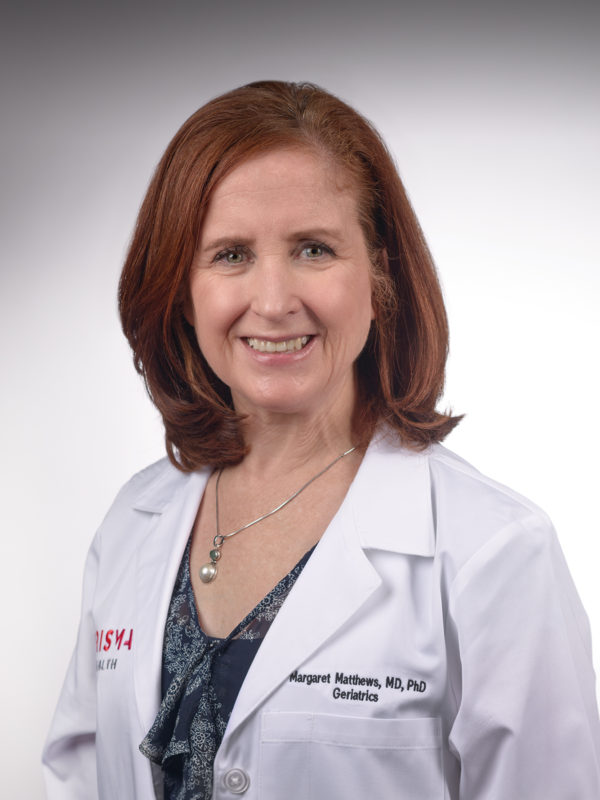Healthy aging – Protecting body and brain after 65
More Americans are living until their mid-80s and beyond than ever before. But the last thing you want is to get into your 80s and be disabled, in pain and dependent on others to take care of you. Geriatrician Margaret Matthews, MD, explained what you can do to remain vibrant and vital in your golden years.
“As you age, you’ll get a little bit more dependent, but we want to try to extend your function as you get into your 80s and then even into your 90s, compressing that very short amount of time at the end,” Dr. Matthews said. “We call that ‘live long, die short.’”
Good health and function always start with preventive care. So, the first step towards healthy aging is to team up with a good primary care professional and have regular health check-ups.
What health screenings are important for seniors?
Playing an active role in your healthcare by getting recommended screenings goes a long way in protecting your health.
Screenings for women who are 65 and older include:
- Cancer – breast, colorectal, cervical
- Blood pressure
- Lipids
- Blood sugar
- Osteoporosis
Screenings for men 65 and older include:
- Cancer – colorectal
- Blood pressure
- Lipids
- Blood sugar
Vaccinations are also important. Common ones include:
- One-time vaccinations – pneumonia, Tdap (tetanus, diptheria and pertussis), and shingles
- Annual vaccinations – Flu and (possibly) COVID-19
“A hepatitis C screening is also recommended,” Dr. Matthews said, “and don’t forget your dental health which is so important to your overall health at every age.”
How can seniors maintain health and independence while aging?
Seniors can maximize their health by maximizing function. In geriatrics, it’s called the “five Ms” which focuses on the following:
- Mind – your memory and mood.
- Mobility – your ability to get things done physically at home, helping with your gait and balance, while preventing falls.
- Medications – this involves doing an assessment of your medications, making sure that they’re accurate, working, and not causing adverse events.
- What matters most to you – this is referring to your health goals, such as your living will and planning for future needs. Think about what you expect out of yourself and out of your care team.
- Multi-complexity – describes how all those needs interact together, taking into account any chronic medical diseases or advanced illness.
How can you improve aging brain health?
Many of us become forgetful as we age, which can be a concern. “The good news is the brain ages the slowest of all organs in the human body,” said Dr. Matthews.
Even better news – there are things we can do to help to slow down that aging even more. This includes controlling or stopping any behaviors that are harmful to your brain. Some risk factors that are harmful to your brain include:
- Smoking
- Uncontrolled blood pressure and blood sugar
- Toxins from drugs, alcohol and processed foods
- Sitting too much
- Depression and stress
- Hearing loss
- Obesity
Factors that can protect your brain include:
- Education
- Exercise
- A heart healthy diet
- Social engagement
- Cognitive activity
- Good sleep habits
- Replacement of vitamins/supplementation
- Calorie restriction or keeping your BMI low
“If I were to give one pill for the brain, it would be exercise – not a pill at all,” Dr. Matthews said. “And that’s because exercise is so great at increasing blood flow in the brain.”
It helps with increasing neural pathway connectivity, it helps you think and plan better, and it helps your mood. It’s also good for the rest of your body, helping to reduce falls and prevent illnesses such as cancer and osteoporosis, encouraging healthy aging inside and out.
How much exercise is recommended for seniors?
A 20-minute walk is all it takes to get your brain going and support healthy aging, but it’s important to mix it up to have a diversity of exercise.
“Each type of exercise can help build the strength and reserve of many different areas of your brain,” Dr. Matthews said. “Everyday activities like cleaning, shopping and gardening are helpful, but you really need to pay attention to how much activity you get. At least 7,000 steps a day is recommended.”
To build up your endurance, make sure to include about 150 minutes a week of aerobic exercise, such as vigorous paced walk where you don’t have the ability to talk while you walk, or activities such as swimming or jogging. And focus on building strength. Using light weights or doing Pilates for 30 minutes 2–3 times a week can help with cognition. Tai chi or yoga can also improve your balance and flexibility, which helps with fall prevention.
What diet is most helpful to seniors?
Dr. Matthews suggests a Mediterranean diet, which is plant-based and rich in phytonutrients as well as healthy fats from fish, olive oil, avocados, walnuts and chia seeds. It includes a very low amount of red meat and no processed foods.
“You want to be heavy on the vegetables and fruits, then the healthy fats and high fiber grains. Make sure you’re including fish and a little bit of dairy. And have a very low amount of pork and red meat,” Dr. Matthews said. “Having a little dessert every now and then is fine but try to stay away from the processed foods.”
What are some other ways seniors can improve brain health?
Socialization is not only fun, but also great for your brain health. Get together with friends and family. It helps your mood and keeps your body invigorated.
Cognitive activities have also shown to be important for your brain. “But you can’t do the same thing every day,” Dr. Matthews said. “It’s fine to do crossword puzzle every day if you enjoy that, but also get out of your comfort zone and try to learn something new.”
Medications can be a risk to your brain, so it’s important to be careful with what you’re taking and how you’re taking it.
Dr. Matthews offered these medication management tips:
- Bring your medicines to every doctor’s visit or an accurate list of your medications so the doctor can review them.
- Keep your medicines organized and make sure you’re using them correctly.
- Let your doctor know if you feel like the medication is causing any adverse effects or if they might not be necessary.
Final tip: Plan ahead and think about what matters to you
Planning for change is helpful, not only for you but for your family. Dr. Matthews suggested thinking about these questions when it comes to healthy aging:
- Where do you want to live in 10 years?
- Do you want to downsize or move to a senior living facility?
- Is your family aware of your wishes?
- Do you have a will?
- Do you have a living will?
“You have to make goals specifically about what’s important to you because sometimes challenging decisions come up,” Dr. Matthews said.
Your primary care physician can help you navigate these questions.
“You can live a long time and we want that to time to be spent healthy and happy, so reach out to a primary care professional,” she said.
Find the care you need, close to home
Our primary care physicians provide well visits and everyday care when you need it with compassion and expertise.
Find Primary Care Near You

